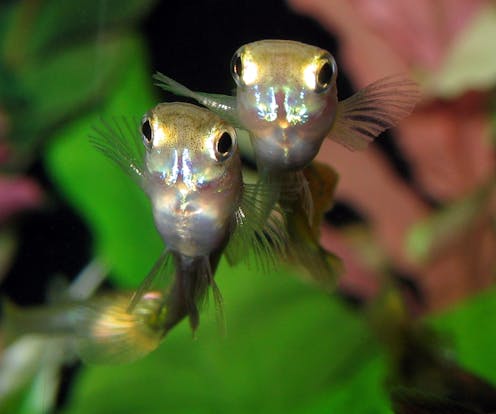Fish on Prozac: chemical residues in wastewater mess with bodies, behaviour and sperm
- Written by The Conversation

Antidepressants have helped millions of people worldwide since the 1950s. But have you ever wondered what happens to these drugs once they leave our bodies?
We wanted to study the effects of pharmaceutical pollution on freshwater fish.
Our new research shows even low levels of the antidepressant fluoxetine – sold under the brand name Prozac, among others – will harm male guppies over time. In laboratory experiments, males exposed to fluoxetine at levels they would likely encounter in the wild suffered wide-ranging consequences.
As our reliance on medication grows, so too does the burden we place on natural systems. If we fail to understand the effects of pollution on wildlife, we risk compromising the health of our ecosystems and the services they provide.
Drugs in our waterways
When we take our medicine, only some is absorbed by our bodies. Most passes through largely unchanged, in urine.
Wastewater treatment plants were not designed to remove these residues. So vast quantities of drugs are released into the environment, along with treated wastewater, worldwide.
This means organisms in waterways downstream from wastewater treatment plants are likely to be bathed in a cocktail of human medicines.
Over time, exposure to these contaminants can potentially disturb animal behaviour, physiology and reproduction. Of particular concern are drugs such as antidepressants, which have been specifically designed to alter brain chemistry in humans.
In recent decades, antidepressants such as Prozac (fluoxetine) have been detected in rivers, lakes and streams across the globe.
Fluoxetine has become one of the most common pharmaceuticals found in our waterways worldwide, including here in Australia.
Fish on chill pills
Despite the obvious differences between humans and fish, we share remarkable similarities.
Pharmaceuticals designed for humans can affect fish and other species because they target receptors we have in common.
Prozac and other brands of fluoxetine increases levels of serotonin in the brain, which increases feelings of wellbeing and happiness. In fish, serotonin is also involved in reproduction, food intake and growth, stress and multiple behaviours.
So it’s not surprising fluoxetine can affect fish. Evidence suggests the effects can be specific to the life stages or even the sex of the fish.
What is surprising is most studies focus on short-term exposure, even though drugs such as fluoxetine can be highly persistent in the environment and affect fish over long periods.
We collected 3,600 wild guppies (Poecilia reticulata) from Alligator Creek in North Queensland. Water samples from the fish collection site showed no contamination with fluoxetine.
Back at the lab, we exposed 15 successive generations of these fish to fluoxetine over five years.
Fish were randomly assigned to one of three levels of exposure, no fluoxetine (control), “low” or “high”. The “low” treatment level represents common surface water concentrations. “High” represents levels typically found in bodies of water heavily dominated by human effluent.
Sex in contaminated water
We found male guppies exposed to low fluoxetine levels were in poor condition, using a measurement similar to body mass index (BMI) in humans. The modified fin male guppies use to inseminate females (gonopodium) was also larger in these males.
Having longer gonopodia helps with mating. So exposure to fluoxetine seemed to trigger a trade-off between physical and reproductive health. When the maintenance of body condition became too costly, the fish put more energy into growing a larger gonopodium.
Low levels of fluoxetine also decreased sperm motility. This means the sperm of exposed males were poor swimmers compared to the sperm of unexposed males.
Female guppies are capable of mating with multiple males. So sperm from different males can compete within the female to fertilise the eggs. Lower sperm motility can therefore reduce the reproductive success of males exposed to fluoxetine.
Strangely, the low-fluoxetine treatment had stronger effects than the high-fluoxetine treatment. But this type of dose-dependent relationship is often found for such drugs and various mechanisms may be at play, such as desensitisation towards higher doses.
Under the influence
Aside from the effects on reproduction, we also studied how fluoxetine exposure affects the activity and hiding behaviour of guppies. Both behaviours are crucial to survival in the wild.
Male guppies exposed to fluoxetine became less capable of adjusting their behaviour in different contexts. They were repeatedly more consistent in their behaviour. In the wild, this can reduce an individual’s ability to respond to environmental changes. For example, consistent behaviour can make a fish an easy target for predators, while unpredictable behaviours can reduce their vulnerability.
Our findings add to a growing body of evidence showing similar behavioural disturbances in exposed wildlife. For example, other studies found antidepressants such as fluoxetine can make fish less active. This could disrupt their ability to compete for food and mates.
Why this matters
Antidepressants can be life-saving for people but pose problems when they find their way into the environment.
Our research has uncovered effects on fish that were largely underappreciated and overlooked, until now. The effects of prolonged exposure to such pollutants demands further investigation.
This will be crucial if we are to develop effective strategies for protecting and managing sensitive aquatic ecosystems, such as better wastewater treatment processes.







